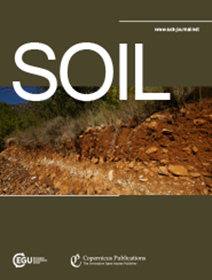Do composted bioamendments enhance the resistance of Mediterranean agricultural soils and their microbial carbon use efficiency to extreme heat-stress events?
IF 5.8
2区 农林科学
Q1 SOIL SCIENCE
引用次数: 0
Abstract
Abstract. Mediterranean agroecosystems are vulnerable to extreme heat-stress, especially because of their low organic matter content. Bioamendments may enhance soil nutrient content and microbial resilience to heatwaves. However, their effectiveness under these conditions is still unclear. We investigated the effect of bioamendments (composted olive mill pomace, biosolids and solid urban residue) and a conventional fertiliser (diammonium phosphate) on microbial carbon use efficiency (CUE), and soil biogeochemistry in two different soils, a calcareous Vertisol and a non-calcareous Inceptisol, with low P availability, subjected to extreme heat-stress. We conducted warming experiments (20, 30, 40, or 50 °C), to monitor 14C-glucose mineralization and to evaluate modifications in soil biochemical properties. As result of warming, both soils microorganisms exhibited thermotolerance until 40 °C, with a critical shift in microbial respiration observed at 50 °C. Consequently, microbial CUE, which was a function of the bioamendments and soil, significantly declined from 0.47–0.65 at 20 °C to 0.27–0.45 at 50 °C (p < 0.05), with the control decreasing by 0.010 ± 0.001 °C-1 (Vertisol) and 0.007 ± 0.001 °C-1 (Inceptisol). Moreover, composted olive mill pomace-treated soils enhanced the resistance of soils to heat stress as they produced the highest microbial CUE at 40 °C in the Inceptisol and 50 °C in both soils (0.43 ± 0.02 Inceptisol vs. 0.45 ± 0.02 Vertisol). Soil biogeochemistry varied with temperature and treatment, while available P in soils treated with diammonium phosphate was reduced with temperature in both soils, and available P added with bioamendments was not affected by temperature but was increased with biosolids for all temperatures in the Inceptisol. In conclusion, organic matter rich bioamendments (composted olive mill pomace) may enhance the resistance of Mediterranean agricultural soils subjected to extreme heat-stress events (50 °C).堆肥生物改进剂是否增强了地中海农业土壤及其微生物碳利用效率对极端热胁迫事件的抵抗力?
摘要。地中海农业生态系统易受极端热胁迫的影响,特别是因为其有机质含量低。生物改进剂可以提高土壤养分含量和微生物对热浪的适应能力。然而,它们在这些条件下的有效性仍不清楚。在极端热胁迫下,研究了生物改性剂(堆肥橄榄渣、生物固体和固体城市渣滓)和常规肥料(磷酸二铵)对两种不同土壤(含钙质的Vertisol和非钙质的Inceptisol)微生物碳利用效率(CUE)和土壤生物地球化学的影响。我们进行了升温实验(20,30,40或50°C),以监测14c -葡萄糖矿化并评估土壤生化特性的变化。由于变暖,两种土壤微生物在40°C之前都表现出耐热性,在50°C时观察到微生物呼吸发生了关键变化。结果表明,微生物CUE在20℃时为0.47-0.65,在50℃时为0.27-0.45 (p <;0.05),对照组分别下降0.010±0.001°C-1 (Vertisol)和0.007±0.001°C-1 (inception tisol)。此外,堆肥橄榄渣处理的土壤增强了土壤对热胁迫的抵抗能力,因为它们在40°C的Inceptisol和50°C的两种土壤中产生了最高的微生物CUE(0.43±0.02 Inceptisol vs. 0.45±0.02 Vertisol)。土壤生物地球化学随温度和处理而变化,磷酸铵处理的土壤有效磷随温度降低,生物改进剂添加的有效磷不受温度的影响,但在所有温度下,生物固体添加的有效磷都增加了。综上所述,富含有机物的生物改进剂(堆肥橄榄渣)可以增强地中海农业土壤对极端热胁迫事件(50°C)的抵抗力。
本文章由计算机程序翻译,如有差异,请以英文原文为准。
求助全文
约1分钟内获得全文
求助全文
来源期刊

Soil
Agricultural and Biological Sciences-Soil Science
CiteScore
10.80
自引率
2.90%
发文量
44
审稿时长
30 weeks
期刊介绍:
SOIL is an international scientific journal dedicated to the publication and discussion of high-quality research in the field of soil system sciences.
SOIL is at the interface between the atmosphere, lithosphere, hydrosphere, and biosphere. SOIL publishes scientific research that contributes to understanding the soil system and its interaction with humans and the entire Earth system. The scope of the journal includes all topics that fall within the study of soil science as a discipline, with an emphasis on studies that integrate soil science with other sciences (hydrology, agronomy, socio-economics, health sciences, atmospheric sciences, etc.).
 求助内容:
求助内容: 应助结果提醒方式:
应助结果提醒方式:


